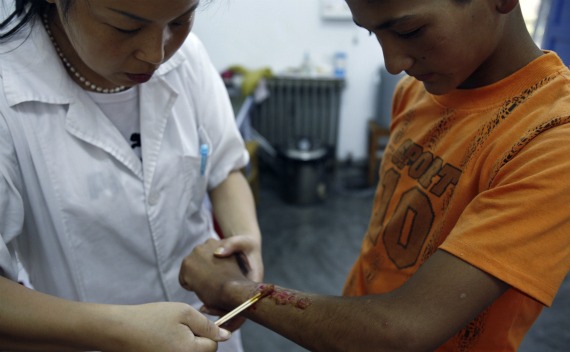The Global Fund, China, and Civil Society
More on:

Last week, I went to Beijing to attend a conference on “China’s Emerging Global Health and Foreign Aid Engagement” co-hosted by the Washington-based Center for Strategic and International Studies and the China Institute of International Studies. My presentation focused on the evolution of Chinese domestic decision-making on global health and foreign aid programs in Africa. Prior to my departure, news came out that the Global Fund to Fight AIDS, Tuberculosis and Malaria had frozen payments of grants to China worth hundreds of millions of dollars. According to the New York Times, the Fund’s decision seemed to be “rooted in a collision between the fund’s conviction that grass-roots organizations must be intrinsically involved in the fight to control diseases like AIDS, and the Chinese government’s growing suspicion of any civil-society groups that are not directly under its control.” The Times’ speculation was later confirmed by the Chinese Ministry of Health officials.
The episode lends further support to my argument that domestic factors play a critical role in China’s engagement in global health. Since 2004, Global Fund financing to China has contributed to growing government commitment to HIV/AIDS prevention and control. Meanwhile, its requirement of involving communities affected by HIV/AIDS in Country Coordinating Mechanism (CCM) – indeed, the Global Fund Round 6 linked the funding to the building of the civil society sector in combating HIV/AIDS – has resulted in the proliferation of health-related NGOs in China. In April 2006, the Global Fund’s push for CCM reform led to an open, transparent, and thoroughly documented election of a CCM NGO representative in China. The NGO sector election brought together NGOs and community based organizations from different sectors and categories for serious discussions and cooperation. Through the election processes, awareness of the necessity and merits of public participation among civil society groups were greatly strengthened: For most of the NGOs that participated, the elections marked their first experience with self-organization.
The government may like the Global Fund money, but it obviously does not like the Global Fund’s ideas as far as civil society is concerned. Indeed, because of the constant lack of government financial support of the civil society organizations (CSOs), Global Fund money contributed to vicious competition among various NGOs which, in conjunction with government divide and rule strategy, resulted in infighting and distrust among the groups. NGOs with more funding but poor accountability ended up gaining disproportionately more power than others, and used that power in an irresponsible manner that jeopardizes the growth of Chinese civil society. Government bias against CSOs also led to the inclusion of many government organized NGOs in CCM, which receive the bulk of the Global Fund funding and resources. This not only results in inefficient fund use, but also hinders the rise of an independent and autonomous civil society. It is no surprise that even today China’s NGOs still lack the skills and experience to engage the Global Fund as effectively as more seasoned NGOs in other countries. The Arab Spring only confirmed Beijing’s fear that CSOs supported by international actors may serve as a Fifth Column in making a Jasmine Revolution in China.
It is puzzling, but perhaps since the nineteenth century there has never been a political regime like China’s that feels domestically so insecure while its international power status continues to improve significantly. In order to encourage the participation of China’s civil society groups in global health, it is important to allay the fears of Chinese leaders. In other words, engaging China in global health as a constructive and active partner may ultimately hinge upon our broader political and diplomatic engagement with China at the top level.
More on:
 Online Store
Online Store
